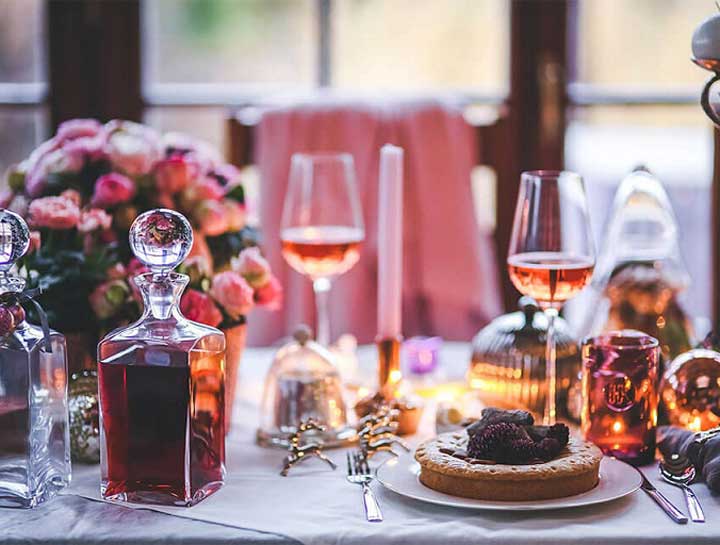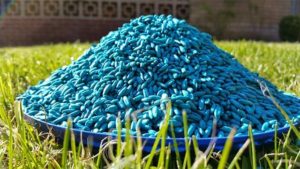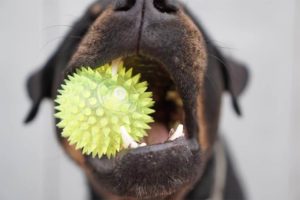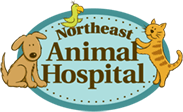Pet Safety for the Winter Wonderland

The winter holidays are a time many look forward to—time off from work and school, a chance to see and spend time with loved ones, sparkly decorations, and decadent foods that we treat ourselves to only once a year. But as fun, as they may seem, some of these things can spell disaster for our pets. Here are some tips and red flags to watch out for to help keep your pet safe this holiday season.
Foods to Avoid
Most of us enjoy indulging this time of year, especially when it comes to food. After all, this is the season when many of our favorite foods become available for only a few weeks! Unfortunately, slipping your pet some table scraps as a “treat” can cause unwanted upset to their delicate digestive system. Here are some “no-nos” along with some healthy alternatives:
- Bones: You may think your dog would love to gnaw on a turkey leg or ham bone. After all, we’re taught that dogs love bones! But the truth is, giving a dog, or cat, any type of bone can be extremely dangerous. It can splinter and cause perforation of the intestines. It can also get lodged in the mouth, throat, or gastrointestinal tract.
Instead: All white-meat turkey can be a nice treat in moderation. Just make sure to remove all of the bones and skin.
- Grapes and Raisins: Even a few raisins can be extremely problematic to your dog, as they contain toxins that can cause kidney damage.
Instead: A few plain cranberries can be a better option if your pet is already used to having them in their diet.
- Cookies: Let’s be honest, the most popular cookies contain chocolate and/or nuts, which are definitely on the naughty list. The biggest nut offender is macadamia nuts, which contain toxins. As little as half a macadamia nut per pound of dog can cause harm to the digestive tract, nervous system, and skeletal muscles.
Instead: We recommend finding cookies made especially for pets.
- Chocolate is hazardous to dogs, as you may already be aware, but did you know that the potentially lethal dose of chocolate for a 16lb canine is just 2 ounces of baker’s chocolate?
Instead: Peanut butter is a great alternative to chocolatey treats, but make sure it doesn’t contain ingredients like xylitol, which is toxic to dogs.
- Onions are problematic for cats as well as dogs. Many holiday dishes like stuffing and green bean casseroles contain onion; even gravy often has onion powder as an ingredient. Not only do they contain onions, but the richness of these foods can cause an intestinal upset as well.
Instead: If your dog is already used to having veggies in their diet, then a few small tidbits are usually well tolerated.
- Other foods to avoid are coffee, alcoholic beverages, and rich or fatty foods.
Remember, treats don’t always have to be food. If you’re looking for a healthy reward your dog will love, take them for a walk!
Keep in mind that any sudden change in diet can cause gastrointestinal upset in your pet. If your pet is vomiting, has diarrhea, or is showing any unusual behavior, don’t hesitate to call your veterinarian or animal emergency vet (if it’s after hours) immediately.

Foods such as chocolate, bones, alcohol, onions, and rich, fatty foods should be kept away from pets. Make sure that trash is taken out after dinner to keep irresistible turkey trussing and food wrappings out of reach.
House Guests
- Visitors may not be used to having pets underfoot, which can be especially dangerous for small dogs. Utilizing baby gates in the kitchen—where dogs enjoy being nearby to watch for delicious morsels to fall—can help keep them from getting stepped on. Consider attaching a bell to their harness or collar so that others can be aware of their presence.
- Guests may also not be used to having to use caution when opening the door. Taping a sign on the door to remind them to watch for pets that may try to slip out can be helpful.
- Since not everyone is aware of what types of foods can be toxic to pets, asking guests not to give pets “people food,” or requesting that they ask you first, can help keep your pet safe.

House guests may not be used to having to keep an eye out for pets, or be aware that some foods are toxic. Be sure to include your guests in the necessary precautions to help keep your pet out of harm’s way.
Christmas Trees
- Ribbons and tinsel can be irresistible to curious kittens and cats but can pose choking hazards and lead to intestinal blockages.
- Christmas tree water may contain fertilizers or other chemicals that can cause stomach upset if ingested.
- Electrical cords can cause electrocution or mouth injuries if chewed so always keep them covered up or hidden, and watch your pet when in the vicinity of these items.
- Glass ornaments can cut the tissues of the gastrointestinal tract if ingested.
- Candles can draw a curious pet’s attention with their flickering flame. Wagging tails run the risk of coming into contact with an open flame, or knocking a candle over. Never leave burning candles unattended. Battery-operated flameless candles are a great, safer alternative to the real thing.

Ribbons, tinsel, ornaments, candles, Christmas tree water, and electrical cords all pose risks to pets and should be kept away from curious paws.
Plant Dangers
- Lilies that may be found in holiday flower arrangements could be deadly to your cat. Many types of lily can cause kidney failure if ingested, even a small amount of pollen that is licked off the fur can be a major problem.
- Poinsettias can also be toxic to pets, causing potential irritation to the mouth and stomach, or nausea and vomiting.
- Mistletoe ingestion usually only causes gastrointestinal upset, but has the potential to cause more serious cardiovascular issues.
- Holly ingestion could cause vomiting, nausea, diarrhea, and lethargy.

Many popular varieties of plants and flowers are extremely toxic to pets.
Other Winter Hazards
- Antifreeze has a sweet, pleasant taste to pets. Unfortunately, even very small amounts can be lethal to a dog or cat. Thoroughly clean up any spills. In addition, store antifreeze in tightly closed containers and store them in secured cabinets. Other automotive products such as gasoline and oil should be stored in areas that are inaccessible to your pets.
- Liquid potpourris can be ingested from simmer pots or a spilled puddle. Pets’ fur can absorb the liquid if they get too close and subsequent grooming can result in severe oral, dermal, and eye damage.
- Rat, mouse, and mole killers are used more commonly during colder weather. If these products need to be used, place them in areas that are inaccessible to your pets.

Winterizing our homes and cars can introduce new hazardous products into our pets’ lives. Be sure to keep them out of a pet’s reach.
Dog Toy Safety
Our holiday safety tips also include toy safety, since many pet owners include their furry family members in gift-giving. Here is a list of popular dog toys (besides rawhides) that aren’t all that safe:
- Antlers: Often seen as the ultimate in all-natural “green” chews, due to being sustainably harvested, elk, moose, and deer antlers have seen a surge in popularity. But it’s their inherent strength (they can withstand the blunt force of a rival buck’s antler in battle) that can inflict serious oral injuries and tooth fractures. Goat, cow, and water buffalo horns can also be added to this list.
- Nylabones or Nylon Chew Toys: Think a Nylabone antler alternative is a safer choice? Not so fast! Hard plastic and hard nylon chew toys, like Nylabones, can be too hard for your dog’s teeth. These toys have little to no “give,” and have led to many tooth fractures. A good rule of thumb with any chew toy is, if you can’t indent the toy with your fingernail, then it’s too hard for your dog’s teeth. What’s more, many of these nylon chew toys are food flavored, making them irresistible non-stop chew toys. Pieces of Nylabones can be ripped off and ingested, leading to a possible digestive obstruction.
- Cow Hooves: Just like antlers and other hard chew toys, cow hooves pose the danger of breaking your dog’s teeth or even splintering, which could lead to puncture injuries of your dog’s mouth or digestive tract.
- Pig’s Ears: These chews can still be found in many pet stores, but beware! They can be coated with a substance that causes digestive upset. It’s also possible for your dog to tear off pieces large enough to cause choking or digestive obstructions.
- Sticks: Free toy, right?! Sticks lead to some of the most distressing injuries to dogs, including puncture wounds to the mouth, eyes, abdomen, and even the heart! Make sure you take sticks away from dogs and give them a safe alternative to play fetch with.

Just because something is made and marketed for pets doesn’t mean it’s safe for them.
Your pet may become poisoned or injured despite your best efforts to prevent it. Keep the telephone numbers for your veterinarian, a local emergency veterinary service, and the ASPCA Animal Poison Control Center (1-888-4 ANI-HELP, https://www.aspca.org) in a convenient location.
Never give your pet any medications unless it’s under the direction of a veterinarian. Many medications that are used safely in humans can be deadly when used inappropriately. If you suspect that your pet has ingested something poisonous, seek medical attention immediately.
We hope this blog will help you be well-equipped to keep your pet safe during the winter holiday season.
Northeast Animal Hospital and Downtown St. Pete Vet Clinic are sister practices located in sunny St. Petersburg, Florida. We are devoted to helping pet owners connect with their pets while educating them on topics that will help keep their pets happy and healthy. If you are local to St. Pete and its surrounding areas and have any questions, please don’t hesitate to contact us. If you’ve found us through a web search, we hope we’ve helped answer your question on this subject. If you reside beyond the Tampa Bay area we recommend you contact your local veterinarian for any further needed assistance.
